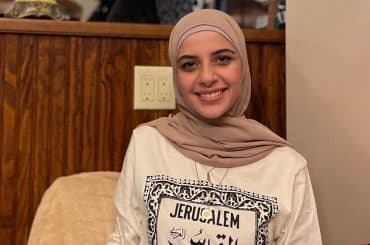Angry protests have erupted all over the world, Israeli ambassadors have been summoned in many countries, and military exercises with Greece have been canceled in response to the Israeli Navy killing up to 19 Palestine solidarity activists that were part of the flotilla aiming to break Israel’s blockade of Gaza.
In occupied Palestine and Israel, demonstrations have also broken out, leading to scuffles with the Israeli police.
To get a better idea of the situation on the ground in Palestine, I had a brief phone conversation earlier in the day with Diana Buttu, a Palestinian-Canadian human rights lawyer and a former member of the Palestine Liberation Organization’s negotiating team. Buttu spoke to me from Nazareth.
Alex Kane: What’s your immediate reaction to the Israeli attack on the “Freedom Flotilla”?
Diana Buttu: It’s a massacre and it’s an act of piracy.
AK: What’s the feeling on the ground in Palestine?
DB: In general, there’s kind of a few things that you can say: The first is that it’s hard to describe exactly how people are feeling. People here have gotten so used to Israel massacring Palestinians. And I think people are really startled that they would go to such an extent to kill not only Palestinians, which people have, unfortunately, grown accustomed to see, but the fact that they would actually go to this extent as to carry out an act of piracy, to carry out an act of massacre on the high seas, that the people they’re massacring are unarmed civilians, very clearly unarmed, and they are internationals. So, people are a little bit stunned by everything that’s happening.
But the other feelings, or a few of the feelings: One is we don’t really know what happened to Sheikh Raed Salah, who is a leader of the Islamic movement. The fact that there’s been such a blackout on media coverage in terms of names of the people who have been killed or injured, their nationality, what’s happening to these people, when will they be released, it’s leading to a great deal of angst. The other thing that it’s leading to other than anger and shock is that it cements the belief that Palestinians have had for decades, which is that Israel views itself as above the law. And that’s the general mood that I would say is permeating here.
AK: Have protests started in the territories?
DB: Protests are everywhere. This just shows how egregious this is. The protests are all over. There were protests in Gaza City, there were protests in Ramallah today, there were protests in Nazareth, protests in Haifa, the Israelis held a protest in Ashdod port. There’s a number of different protests taking place throughout the country.
AK: What do you think the larger ramifications are for, say, Israel’s deepening isolation internationally?
DB: I certainly hope that there is a deepening isolation internationally. I’m not one who believes that Israel is really paying a price for its war crimes and as much as the boycott and divestment movement is picking up, I think it needs to be expanded and it needs to become much stronger against Israel. This is just one such example as to why this needs to happen. If you just look at the past year, the number of times Israel has violated international law is astounding. And today’s act in particular is really remarkable.
Israel’s blockade itself is a crime against humanity, according to Goldstone, who seriously questioned the rationale or the logic behind the blockade. Israel then carries out a massacre and an act of piracy in order to continue to ensure that this blockade is taking place, this very act that is inhumane.
It seems to be that there is no end in sight to the amount of Israeli arrogance that there is in terms of flying in the face of international law. And earlier this year we saw, with the incident regarding the use of British and other passports in order to carry out an assassination, that Israel does really view itself as being immune from international action and international accountability, which is why I really believe that boycott, divestment and sanctions are really the only way to go forward. If this doesn’t call for state sanctions against Israel, I’m not sure what does.
AK: Last question: what do you think the United States will do, if anything?
DB: That’s a very, very good question. What I just heard is that there’s not going to be a meeting with Netanyahu and Obama, I’m not sure at whose instigation that meeting ends up being canceled. It may have been from Netanyahu, it may have been from Obama, I really don’t know. But I’m hoping to see that there is a swift and decisive U.S. reaction, and not the wishy-washy one so far we’re seeing now, that “we regret that people have been killed.” Do I think that it will amount to much? No. I think instead we’re going to hear a very lukewarm statement. I don’t think that we will hear a condemnation at all. I think that we will hear a mild statement that we’ve heard in the past following every massacre, which is that “the peace process must continue,” because this is the only way to put an end to such massacres.

